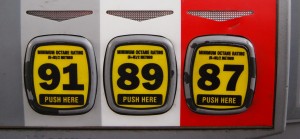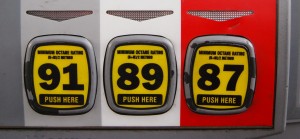 At most gas stations you have a choice between three grades of gas: high, medium and low octane, commonly referred to as Premium, Plus and Regular. Most people assume that high octane is the best fuel, but unless you have a high performance engine you are completely wasting your money.
At most gas stations you have a choice between three grades of gas: high, medium and low octane, commonly referred to as Premium, Plus and Regular. Most people assume that high octane is the best fuel, but unless you have a high performance engine you are completely wasting your money.
Watch my video below:
Let me explain further.
At the gas station nearest to me I can choose 91, 89 or 87 octane. The highest octane gas always costs the most. The question is this: If all three of these grades of gas cost the same amount of money, which one would you choose? Most people would say the 91 is the best quality gas. That is the myth and you would be wrong to believe it.
That expensive gas does not make your car go faster, get better gas mileage or make your engine last longer. Yet it is not surprising that most people would think that 91 is a better gas than 87. The gas companies have done their part to condition you into believing the higher grade gas is better. Of course they do this because there is a better profit margin for them on premium gas. The fact that they even call it “premium” implies that the gas is better. Premium things usually are. In an effort to market to consumers that want the “higher quality” but can’t quite afford the price of premium, the fuel manufacturers created the additional mid-octane fuel solely to give people more choices hoping that at the very least, most people would choose the middle option given a choice over the cheap (read low octane) stuff. Indeed that happens to be the case. At just about any gas station you can tell most people choose the mid-grade fuel based on the button wear and tear. Again most people are choosing too high of a grade and spending too much money. There is absolutely no benefit to running premium fuel in a regular engine.
On the other hand running low octane fuel in a high performance engine can increase the risk of engine damage and will certainly impact that car’s overall performance. A higher octane fuel is only useful if you have a high combustion engine. Unless you drive a high performance car such as a BMW, Mercedes or another high performance, luxury or sports car then you should be putting in the less expensive gas. Save your money for more important things that actually matter.
Octane Explained:
In a normal compression engine the fuel gets compressed inside the chamber and at a precise moment the spark ignites the compressed fuel/air mixture, thereby thrusting the piston downward in the power stroke. The exhausted gas gets vented and then the fresh fuel/air mixture is brought into the combustion chamber and the process of compression begins all over again. There is no need to delay the ignition with special high octane fuel.
So why do high performance cars with higher compression engines need the higher octane fuel? In short, the trouble with gas is that if it is compressed too much it starts igniting on its own, without a spark, rather than when you want it to. In fact diesel engines work on this exact concept with no need for spark plugs. However, in a high compression gas engine, the air is packed more tightly within the combustion chamber and ordinarily that would ignite the fuel/air combination a bit sooner than it should be. Therefore it needs something that delays the ignition a fraction of a second. That is what octane does.

This is precisely why a high compression engine needs to have a delayed reaction, so that it can compress to a higher ratio without spontaneously combusting. The higher the octane rating, the higher the compression a fuel can withstand before igniting. In essence the higher octane gives more control over the combustible fuel allowing the engine more compression before firing.
So, how do I know which gas to get for my car?
To know which gas your engine is designed for you should consult your owner’s manual. Also, if your engine is a high performance engine it most likely will have the higher octane rating posted on the gas filler door as a reminder.
In the end, if you drive a regular car then most likely your engine is most happy with regular gas and you will be happier with the cost to fill your tank.
Greg Macke- Your Car Angel
![]() Greg Macke is a car blogger and author of “My 7 Secrets to Buying a High Quality Used Car”. He is a professional car buyer and consumer advocate working closely in the industry to improve the buyer’s experience. His high quality car buying tutorials offer help to the car buying public. – See more at: https://carbuyingsupport.com/
Greg Macke is a car blogger and author of “My 7 Secrets to Buying a High Quality Used Car”. He is a professional car buyer and consumer advocate working closely in the industry to improve the buyer’s experience. His high quality car buying tutorials offer help to the car buying public. – See more at: https://carbuyingsupport.com/
Source link


